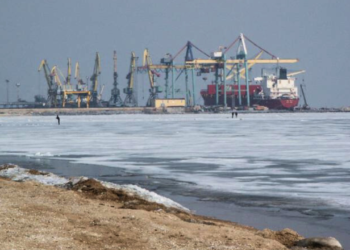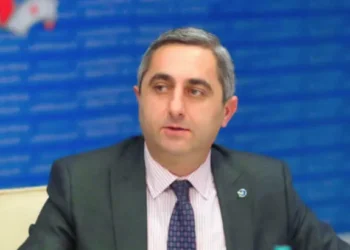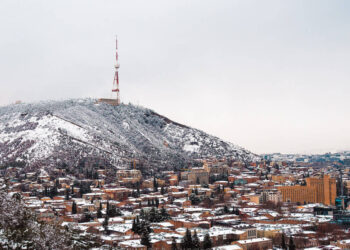Dr. Andrey Makarychev is Professor of Government and Politics at the University of Tartu, Estonia, and Associate Senior Researcher at CIDOB (Barcelona Center for International Affairs). His areas of expertise are Russia – EU relations, post-Soviet countries, mega-events in Eastern Europe and Eurasia, and issues of biopolitics, with his most recent book ‘Popular Biopolitics and Populism at Europe’s Eastern Margins’ published by Brill in 2022. Radio free Europe’s Georgian Service sat down with him to discuss the Polish rocket crisis, the war, and Putin’s future.
“The Polish missile strike has to be used by Ukraine and Poland together to make an even stronger claim for enhanced air defense, not only on NATO’s eastern flank, but also when it comes to the Ukrainian sky. One of the outcomes of this incident would be a proposal from Ukraine to Poland to help Ukraine eliminate Russian missiles as soon as they enter Ukrainian territory, as no-one knows what the destination point is. I think it a reasonable and logical idea for Poland to be kindly invited to at least partly close the sky, so Ukraine can prevent missiles being used against civilians and urban infrastructure.
Suppose, in an ideal world, Poland accepts that offer. What would Russia’s response be?
Well, it’s hard to say because what happens with the Russian foreign policy generally is a jump from one unpredictability to another. I don’t think Russia is interested in direct confrontation with any of the NATO members. The Russian military commanders understand the depth of Russian problems in Ukraine. And under these circumstances, to open a second front would be even more suicidal than the decision taken on February 24. But maybe I’m trying to rationalize Russian foreign policy. Maybe this is all in vain.
What do you think of the Western response to the Poland missile strike?
The best Western response would be to strengthen NATO’s military infrastructure in all countries bordering Russia, including the Baltic States. It would be quite useful if NATO or specific NATO members would help Ukraine to target Russian missiles. That would be the best solution, the best outcome.
We’ve seen the psychological effect of the freeing of Kherson in Ukraine, but what was the psychological effect of it in Russia?
I would say the spectrum of attitudes in which it was perceived ranged from deep regret to the understanding of the deep defeat that Russia is facing. Of course, there are people, especially those who go public, who would say that this is just a tactical maneuver, not something that is really a game-changer. I think they’re just trying to save Putin’s face. I would definitely say that this is a major defeat, and I don’t see how Russian propaganda can hide it. I know it’s already being discussed why it happened and who has to be blamed. Some reasonably independent Russian media sources are saying Putin is not really in control of the situation, and that his weakness is becoming more and more visible.
Let’s take the fact that Putin did not attend the G20 summit in Indonesia. It’s a very clear signal of a sense of depression in the Kremlin. I do think he was considering going, but I think even he understands that he has nothing to put on the table. The Kherson retreat is a major contributor to the fact of Putin’s non-attendance, as well as to the strange performance of Lavrov and his premature departure. This behavior betrays a sense of deep disorientation, and, I would say, even fragmentation and a lack of options. One defeat leads to another. What happened in Bali was another defeat. The fact that when the summit was still in progress, Russia launched a 100-missiles strike against Ukraine is outrageous. Even Russia’s best friends like China and India are growing ever more skeptical. At least wait until the summit ends! Don’t do such a thing intentionally! It’s a gesture of disrespect to the G20, especially considering that half of them are still on the phone, not averse to communicating with Russia. Maybe they’re not friends, but they still believe that Russia is fighting for multipolarity, that Russia is fine fighting against US hegemony. Now, I think this message has become even less convincing.
What is the impact of the Kherson retreat on people you’ve dubbed as “Homines Putinus” – “immature and ill-developed with a paradoxical combination of aggression (towards Ukraine) and submission (to Putin’s rule)”?
This is an empirical question. For that, we need sociologists to do fieldwork. What I can see in the media is that the sense of frustration and resentment is growing in Russia; disillusionment and disappointment in everything, including in their own government. It’s not good, because it’s exactly this sense of resentment that might give rise to an even harsher Neo Fascist regime, because Putin promised that Russia is going to be great again, and a certain part of the population was buying this argument. Now, with a “special operation,” which transformed into full-fledged war, and not a victorious war, I’m afraid that the sense of frustration is going to grow in Russia. And I do think that this is exactly something that was fundamental for understanding the phenomenon of German fascism in the late 20s and 30s. I’m afraid that Russia is moving in this direction.
Keeping that in mind, how many Khersons can Putin survive?
The answer to this question depends on two factors: First, the determination of the Ukrainian armed forces and Ukrainian president to go ahead and fight the occupation, including of sacred places like Crimea. That’s number one. And number two is the determination of the West to keep helping Ukraine, to increase their assistance, regardless of how long it takes. I do think that on both accounts, we might expect reasonably positive news.
A second defeat comparable in scope and scale with Kherson might well be the last for Putin. His power is already cracked, that’s clear. He tries to maneuver, he tries to outsource some powers to people like Kadyrov, Prygozhin, etc., but these are all symptoms of the lack of a grand strategy. I think he’s relying on buying time. Maybe he thinks he needs time to redress his armed forces, to buy another bunch of drones from Iran or whoever, but it’s clear that his so-called mobilization did not really change anything except to add new problems for him domestically. It’s a vicious circle: Whatever he does is not good, and whatever he does amplifies his problems, both internationally and domestically. Look at what’s happening in Belgorod. It’s really amazing. A territory of the Russian Federation is a battlefield, and what do they do? Nothing. Can you imagine? A part of the Russian Federation is already in flames. It’s already well part of the war. Putin is cornered, even conceptually, by expanding or extending the borders of Russia. Now, Russia has become a country without borders. The latest Russian anecdote is a guy goes into a bookstore and asks for a map of Russia, and the shop assistant asks “A map for what date?” If Kherson is Russian, that basically means that Ukraine took Russian territory, so this it is a defeat for Russia. So for him, no explanation is good.
With Putin cornered, how big is his temptation to reach towards the “red button”?
This option is going to be a disaster for him personally. I think he was playing with this option for quite a while, and he was expecting people to be so frightened that they would give up, including Ukraine, for this blackmail. But it didn’t work. And my expectation is that at a certain point, Putin got the message that nuclear weapons are off the table. Of course, it might be a measure of the last resort. But so far as I understand, it’s not on the agenda.
Interview by Vazha Tavberidze














